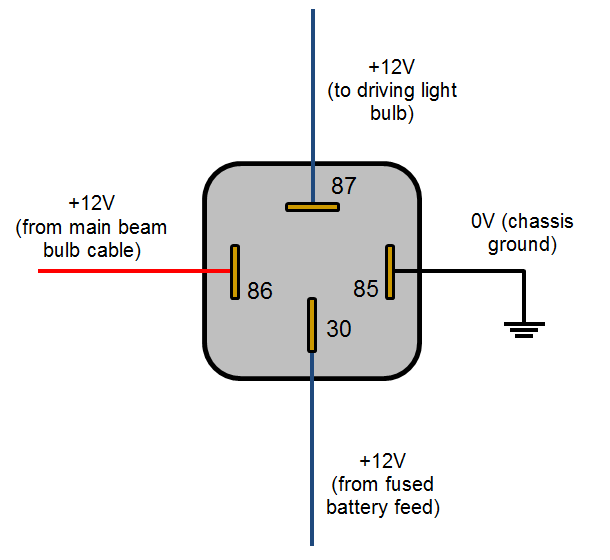Starting Strong: Your Guide to Wiring a 12V Starter Relay

Ever found yourself staring under the hood, a little lost and intimidated? Maybe your car won’t turn over, and you suspect the starter relay. Wiring a 12V starter relay might seem daunting, but it's a surprisingly manageable task with the right guidance. This guide will break down the process, offering practical tips and clear explanations to empower you to take charge.
So, what exactly does a starter relay do? It's the small but mighty component that switches a high-current circuit, allowing your car's starter motor to crank the engine. Think of it as an intermediary, protecting your ignition switch from the heavy electrical load. Without it, your car wouldn't start, leaving you stranded. Mastering the 12V starter relay wiring process is essential for any DIY enthusiast or car owner.
The use of starter relays became widespread with the advent of more powerful electrical systems in vehicles. Early cars relied on direct connections, which put a strain on the ignition switch. The starter relay solved this issue, extending the life of the switch and improving reliability. Today, it's a standard component across virtually all vehicles.
One of the most common issues with a faulty starter relay connection is the dreaded click-no-crank scenario. You turn the key, and all you hear is a clicking sound, but the engine doesn’t start. This often indicates a problem with the relay's connection, a blown fuse, or a failing starter motor. Troubleshooting this requires understanding the wiring diagram and using a multimeter to check for continuity.
Before we delve into the wiring process, let's clarify the basic parts of a 12V starter relay. Typically, you'll find four terminals: 30 (battery positive), 85 (control coil positive), 86 (control coil negative), and 87 (output to starter). Each terminal plays a crucial role in the relay's operation. Understanding these terminals is the foundation for successful wiring. Now, let's demystify the process of connecting these terminals correctly.
One benefit of understanding how to wire a 12V starter relay is the cost savings. Instead of paying a mechanic, you can tackle this repair yourself. Another benefit is the empowerment that comes with understanding your vehicle's electrical system. Finally, knowing this process can save you valuable time in emergency situations.
Action Plan: Wiring Your 12V Starter Relay
1. Disconnect the negative battery cable. Safety first!
2. Locate the starter relay. Consult your vehicle's repair manual.
3. Identify the terminals (30, 85, 86, 87).
4. Connect the wires according to your vehicle's wiring diagram.
5. Reconnect the negative battery cable and test.
Advantages and Disadvantages of DIY Wiring
| Advantages | Disadvantages |
|---|---|
| Cost savings | Risk of incorrect wiring |
| Increased knowledge of your vehicle | Potential for damage if done incorrectly |
Best Practices:
1. Always disconnect the battery before working on any electrical components.
2. Use the correct gauge wire for the circuit.
3. Secure all connections with appropriate connectors.
4. Double-check your wiring against the diagram.
5. Test the starter before reassembling everything.
FAQ:
1. What is a starter relay? A: A switch for the high-current starter circuit.
2. What causes a clicking sound? A: Often a faulty relay connection or starter motor.
Tips and Tricks:
Use a wiring diagram specific to your car model.
In conclusion, learning how to wire a 12V starter relay is a valuable skill for any car owner. From understanding the basic principles to troubleshooting common issues, this guide equips you with the knowledge to tackle this task confidently. By following the steps, best practices, and safety precautions outlined above, you can not only save money and time but also gain a deeper understanding of your vehicle. Don't be intimidated by the process. Take the time to study the wiring diagram, gather the right tools, and empower yourself with the knowledge to keep your car running smoothly. The satisfaction of a successful DIY repair is well worth the effort. So, next time you hear that dreaded click, you'll be ready to diagnose and fix the problem like a pro.
Unlocking your potential conestoga college job opportunities
Navigating healthcare in south carolina with humana insurance
Transform your space with sherwin williams blue gray paint













